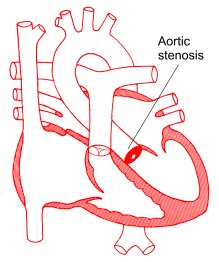Aortic stenosis is a condition that causes obstruction of blood flow between the left ventricle and the aorta. There are different causes, including obstruction at the valve itself, or narrowing of the aorta above the valve.
The most common form of aortic stenosis is obstruction at the valve itself.
Patients with aortic stenosis are usually otherwise in normal health. A heart murmer is the most common sign detected by a physician indicating that a valve problem may be present.
Patients with mild-to-moderate degrees of aortic stenosis will have easily detectable heart murmurs, and are typically without any symptoms at all.
Symptoms occur only with severe aortic stenosis. For example, a newborn with critical aortic stenosis will develope heart failure in the first days of life if not treated.
In older patients, severe aortic stenosis rarely causes heart failure. The patint may experience chest pain, lightheadedness or fainting spells especially when exercising. Severe aortic stenosis is a rare, but well-documented, cause of sudden death during strenuous sports activities.
Long-term follow-up, with regular evaluations by a qualified cardiologist, is essential to helping provide the highest quality outcome for patients with aortic stenosis. When ever a person experiences any of these symptoms, they should speak to their doctor immediately.
